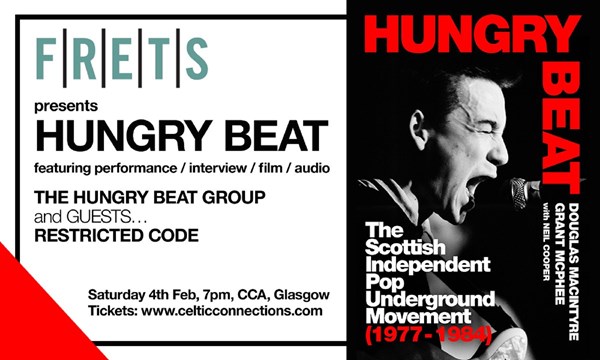Hungry Beat: White Riot Tour Edinburgh ’77
Thanks to Douglas MacIntyre, co-author of the illuminating new book Hungry Beat for sharing an extract for our blog. Read on…

Hungry Beat cover photo – Davy Henderson/Fire Engines (photo credit Harry Papadopoulos)
Hungry Beat is a definitive oral history of two maverick Scottish independent record labels, Fast Product and Postcard, and the Scottish post-punk period. Covering the period 1977-1984, the book begins with the Subway Sect and the Slits performance on the White Riot tour in Edinburgh and takes us through to Bob Last shepherding the Human League from experimental electronic artists on Fast Product to their triumphant number one single in the UK and USA, Don’t You Want Me. Largely built on interviews for Grant McPhee’s Big Gold Dream film with Last, Hilary Morrison, Paul Morley and members of The Human League, Scars, The Mekons, Fire Engines, Josef K, Aztec Camera, The Go-Betweens and The Bluebells, Hungry Beat offers a comprehensive overview of one of the most important periods of Scottish cultural output and the two labels that changed the landscape of British music.

SCARS – (photo credit Hilary Morrison)
VIC GODARD: I took the name Godard from Jean-Luc. I used to go and see his films with Rob Symmons before we started Subway Sect. We’d often go to see late-night films by Godard, Truffaut, Malle. I was at school with Rob and we decided to start a group, though we weren’t a group as such, Subway Sect was really just a name. Originally we mucked about in a youth club then we bought a drum kit on hire purchase but we didn’t know anything about drums. We thought a bass drum was purely for displaying your name. Malcolm [McLaren] saw us at Sex Pistols gigs and asked Rob if we were a group, so of course we said yes, and he asked us to start playing gigs. Bernie Rhodes then invited us to rehearse at his place, Rehearsal Rehearsals. He said he wouldn’t charge us but we had to mop the place out, which of course we didn’t do. Malcolm McLaren then asked us to play at the 100 Club Punk Festival, so that was really the beginning of Subway Sect. Bernie Rhodes started managing us so we were invited to play on the Clash’s tour in 1977, the White Riot tour.
HILARY MORRISON: When the White Riot tour came to Edinburgh on 7 May 1977 it was one of those moments where you realised that all the things you were feeling about being disenfranchised, young, poor and confused were reflected back at you. Seeing the Subway Sect and the Slits was absolutely extraordinary, the bands came down and mixed with the audience and chatted and that was just unheard of, absolutely unheard of.
BOB LAST: Hilary Morrison bought me Buzzcocks’ Spiral Scratch and that was the key moment. I listened to Spiral Scratch and thought, ‘OK, this is what Fast Product should do,’ and went out to find my Spiral Scratch.
DAVY HENDERSON: The first punk gig I saw was the White Riot tour. It was a real year-zero moment, I mean it was incredible. I used to go and see bands a lot prior to punk – I’d seen AC/DC, Cockney Rebel, Be-Bop Deluxe when I was a kid, I’d go to see anything. You knew you’d never see Bowie because Bowie had retired. Suddenly, with punk that excitement was there in the shape of the Slits, because bands before that were like divinities almost, you know, they were rock stars, separate, they weren’t connected in any way to the people who were out front in the audience. They cultivated that because they wanted to be stars, and people wanted them to be stars, and that completely changed the very first time the Slits walked onstage. They were young girls, the singer was exactly the same age as me actually, she was sixteen. Ari Up walked onto the stage and said, ‘Has anybody got a comb?’ She asked the audience if anybody had a comb and came down into the audience, so she had broken that barrier right away by coming down into the audience and getting a comb off somebody and started back-combing her hair. It was unbelievable. I have a vivid memory of seeing the Slits, followed by the Subway Sect, who were like a Dada-esque performance like Hugo Ball, the first Dada performance, it was incredible. Buzzcocks followed, just an amazing energy, it was around the time of Spiral Scratch and I became a total Buzzcocks fan.

Hungry Beat – Douglas MacIntyre, Neil Cooper, Grant McPhee (photo credit Gavin Fraser)
FORTHCOMING HUNGRY BEAT EVENTS: LA BELLE ANGELE, EDINBURGH, SATURDAY 19TH NOVEMBER
CELTIC CONNECTIONS, GLASGOW: 
